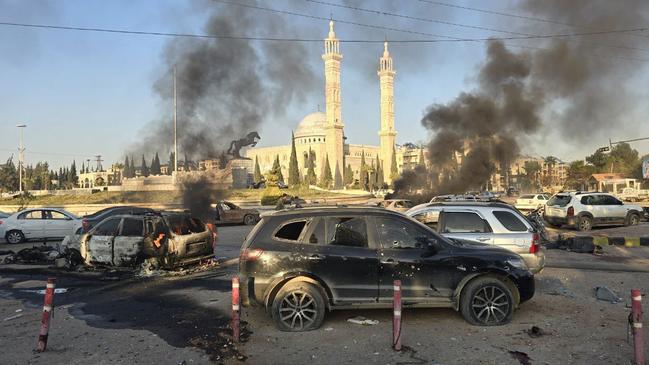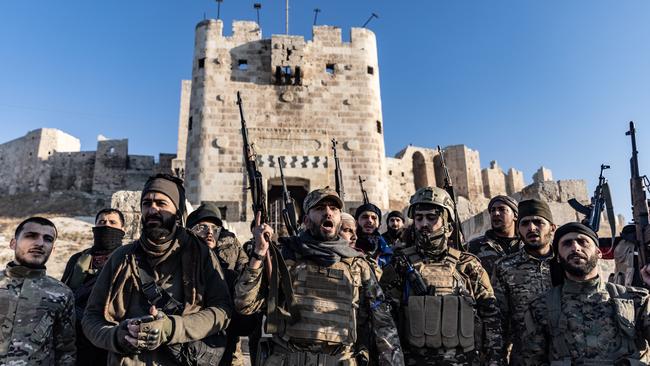Rebel forces in Syria take most of Aleppo in surprise offensive
Anti-government forces deal a setback to Damascus regime and its allies, Russia and Iran

Syria’s antigovernment rebels claimed a stunning advance into Aleppo, a major symbolic and strategic prize, in a setback for the government in Damascus and its allies Russia and Iran.
Islamist-led insurgents poured into Aleppo two days after launching an unexpected strike from the country’s rebel-held northwest and eight years after the city fell to forces loyal to the government of Bashar al-Assad at the end of a long siege.
The rebel assault is the most significant change in years in the balance of power in Syria, a conflict that became an arena for competition among world powers, also drawing in the US, Turkey, Israel and an array of other outside actors.
Assad narrowly survived a popular revolution that sparked an armed insurrection against him in 2011. With the help of Russian air power and military support from Iran and its allies including Lebanon’s Hezbollah movement, he suppressed the uprising using bombings, chemical weapons and mass arrests of opponents.
Aleppo was a symbol of the rebellion after protests took place there in 2011, and the opposition claimed parts of the city in 2012. The rebel-held section of the city fell to the government in 2016 after a long campaign of bombing by Russian and Syrian government aircraft and a siege.
Though his regime kept control of Damascus, Assad was forced to cede swaths of the country to rebels in the northwest and to US-allied Kurdish-led militias, which control much of northeast Syria following an US-backed campaign against Islamic State extremists.
The rebels also captured territory across the countryside outside of Aleppo, and by Saturday said they advanced on the city of Hama, a large population center, in another sign of a rapid collapse by forces loyal to Assad. The state news agency of the Damascus regime denied reports of rebels capturing areas near Hama.
The rebel offensive poses a major challenge to Assad, whose strategy for holding on to power has centered on maintaining control of a spine of cities up and down western Syria.
The government in Damascus acknowledged on Saturday that at least some of its forces had retreated from Aleppo, with the defense ministry saying that it had engaged in a “strategic redeployment” to reinforce its lines and prepare a counterattack. The statement said dozens of government soldiers had been killed in fighting across northwest Syria and that opposition forces had entered significant portions of Aleppo.

The offensive comes as Assad’s allies are under increased pressure. Russia has poured military resources into its invasion of Ukraine, and Iran and its allied militias have suffered severe setbacks during an Israeli military offensive in both Lebanon and Syria. Israel agreed to a fragile cease-fire in Lebanon earlier this week.
It also comes on the eve of the second administration of President-elect Donald Trump, who previously imposed a policy of pressure on Iran and launched airstrikes against Syrian government military assets.
Dareen Khalifa, a senior adviser at International Crisis Group, a conflict-resolution organization, said those global political dynamics played a large role in the rebels’ decision to launch their offensive.
“It’s a perfect storm in a sense. If not now then when?” she said. “They have been thinking about this so much and trying to see if there’s any opening, and probing around and trying to sense for regime vulnerabilities.” After days in which the regime’s defenses crumbled with astonishing speed, Assad and his allies moved to retaliate, with Russian and government aircraft launching strikes in rebel-held territory.
The Syrian Civil Defense, an independent rescue organization also known as the White Helmets, said Russian and Syrian-regime airstrikes hit in the countryside north of Aleppo on Saturday. Airstrikes on Friday killed four civilians and wounded 25 others including eight children, the rescue organization said.
The Russian defense ministry said late on Friday that it launched strikes in both Aleppo and Idlib provinces. Russian Foreign Minister Sergei Lavrov also spoke on the phone with his Turkish counterpart, calling for coordination to stabilize the situation in Syria.
The rebels’ offensive involved thousands of antigovernment fighters, including from Hayat Tahrir al-Sham, a Sunni Islamist group that the Trump administration in 2018 designated as a terrorist organization. HTS is an offshoot of the Nusra Front, which the US considers an affiliate of al Qaeda.
Karam Shaar, the head of a consultancy focused on Syria, said the introduction of new technologies, including drones, into the rebels’ arsenal was critical to their advance.
“The control over Aleppo is happening at a spectacular pace because everyone is panicking and everyone is leaving,” he said. “The operation is to control Aleppo and to pressure the regime into negotiating.” The rebels said they were going on the offensive on Wednesday. By Friday night, they declared a new era in Aleppo.
“People of Aleppo, your liberation from the clutches of this criminal regime brings in a new era of pride and dignity,” said Mohammad Al-Bashir, head of the HTS-allied Salvation Government, which rules much of northwestern Syria.
The UN humanitarian affairs office said at least 125 incidents of shelling, airstrikes and other attacks had been reported in northwest Syria’s Aleppo and Idlib provinces in recent days. On Wednesday and Thursday, 12 civilians, including four children, were killed and 46 others injured.
Earlier on Friday, the rebel military command claimed control of the town of Saraqib, an important center of the rebellion against Assad and a strategic location at the intersection of two major highways in the northwest.
The Wall Street Journal



To join the conversation, please log in. Don't have an account? Register
Join the conversation, you are commenting as Logout